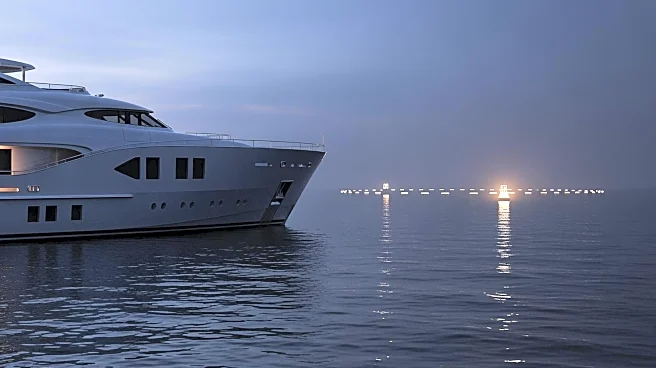What's Happening?
The superyacht Nord, owned by Russian billionaire Alexey Mordashov, has been granted special permission to sail in Arctic waters, a privilege not commonly extended to most vessels. The yacht, which costs approximately $500 million and weighs around 10,000
tons, is equipped with six levels, a helicopter pad, a sports center, and accommodations for 36 guests. Despite the sanctions following Russia's invasion of Ukraine, which led to the seizure of many yachts owned by affluent Russians, the Nord has managed to evade capture by turning off its AIS tracking system and undertaking long, continuous journeys. Recently, the yacht has traveled from Vladivostok, Russia, to the Maldives via the Malacca Strait, after spending time in Hong Kong and Cape Town.
Why It's Important?
The movement of the Nord highlights the challenges in enforcing sanctions against Russian oligarchs, particularly in the maritime domain. The yacht's ability to evade seizure by disabling its tracking system raises concerns about the effectiveness of current regulations and the environmental impact of such vessels. Superyachts like the Nord consume significant resources, including fuel, which contributes to pollution and harmful emissions. The situation underscores the need for stricter regulations and accountability for the wealthy, whose actions can exacerbate climate change. Monitoring the Nord's movements allows for public scrutiny and potential policy adjustments to address these issues.
What's Next?
There is potential for increased scrutiny and pressure on regulatory bodies to tighten restrictions on superyachts like the Nord. Environmental groups and policymakers may advocate for more stringent measures to prevent such vessels from operating without oversight, especially given their environmental impact. The ongoing monitoring of the Nord's movements could lead to calls for international cooperation to enforce sanctions more effectively and hold owners accountable for their actions.
Beyond the Headlines
The Nord's evasion tactics reflect broader issues of wealth inequality and the environmental footprint of luxury lifestyles. The ability of the ultra-rich to circumvent regulations and continue wasteful practices highlights the need for systemic change in how resources are consumed and regulated. This situation may prompt discussions on ethical consumption and the role of the wealthy in contributing to global challenges like climate change.

















